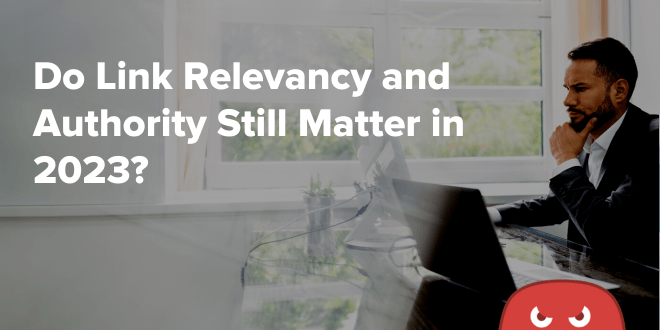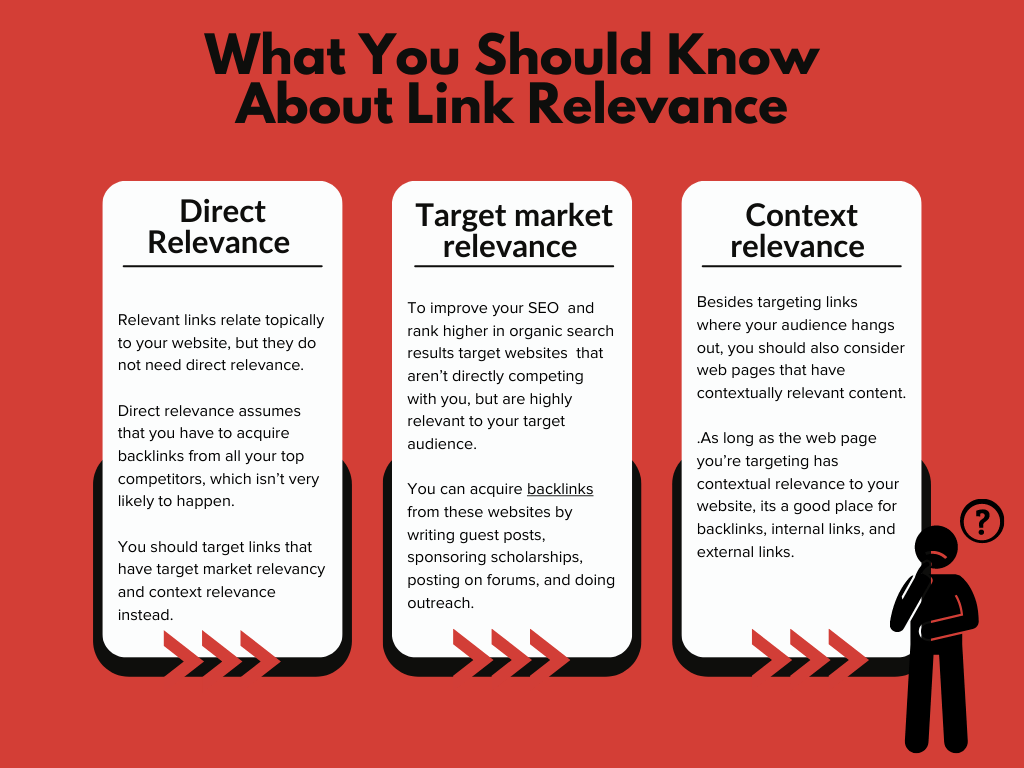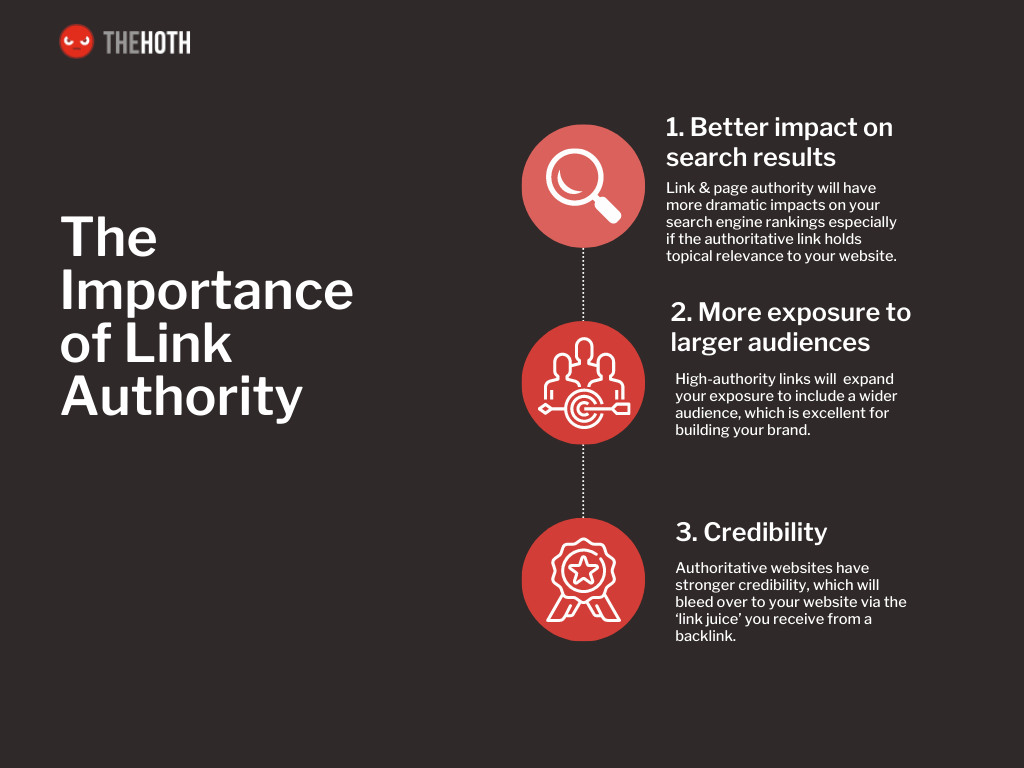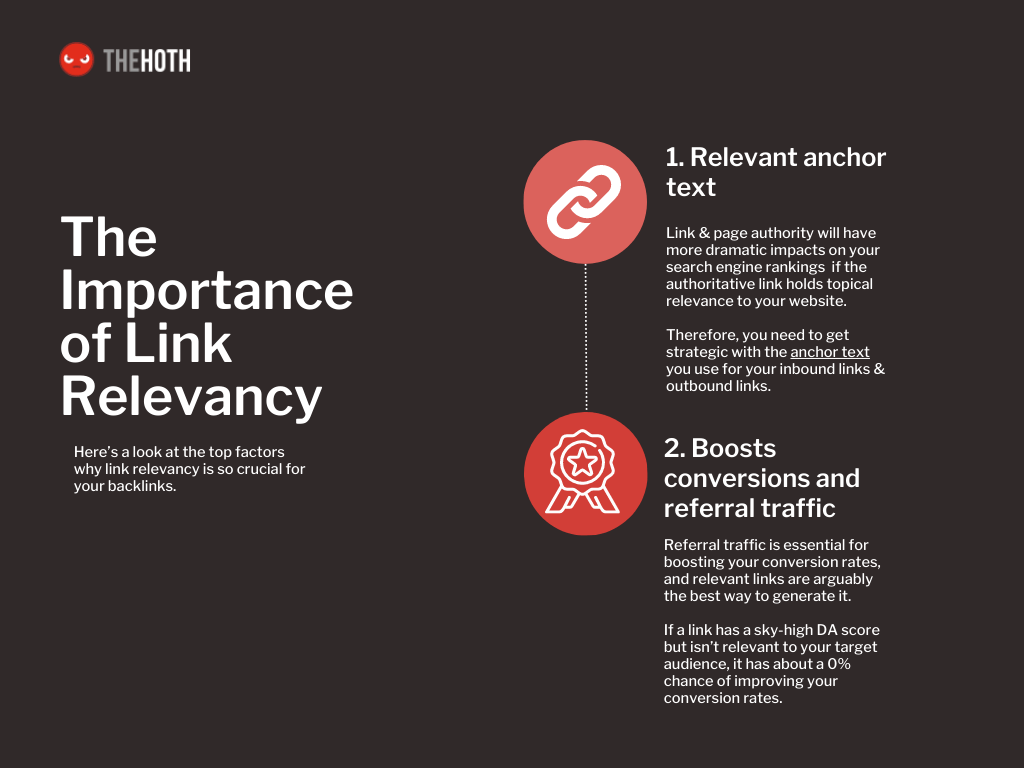Quick Links
High-quality links have been a big deal for SEO strategies ever since Google’s inception in 1998.
Before that, search engines relied entirely on keyword usage to rank websites in their results pages, which caused a high influx of low-quality sites capitalizing on keyword spam.
Larry Page and Sergey Brin wanted their search engine to center around citations – where you point to others’ work to build up your own – and the concept of link–building was born.
You can think of links as ‘votes’ for your page to rank higher on the SERPs (search engine results pages), and a link’s relevancy and authority determine the strength of that vote.
Before Google’s Penguin update in 2012, domain authority reigned supreme.
As long as you could secure outbound links from high-authority sites (think the New York Times and Amazon), it would pay off in the rankings.
However, this caused SEO experts to take backlinks from any site they could find with a high DA (domain authority) score – forgoing relevancy as a result. Thus, ever since the Penguin update, links from relevant sites are equally (if not more) important than authority links.
Since the #1 result on Google contains an average of 3.8x more backlinks than positions #2 – 10, link-building is something you’ll want to take seriously.
Read on to learn more about link relevancy & authority, including how to use both for better search engine rankings.
What’s Link Authority?
A link’s authority directly correlates to the authority of the page & domain it links to, which is crucial to understand.
Also, domain authority as a ranking factor is pretty difficult to calculate.
While we know that Google measures the authority of links, pages, and domains – they’ve been intentionally tight-lipped about it.
The best measuring stick that we have is the Domain Authority Score, which is a metric that was developed by Moz (not Google). It’s used to determine the authoritativeness of a domain, represented as a score from 1 to 100.
Moz uses a combination of 40 ranking signals to calculate a website’s DA score, some of which are still a mystery.
Since it’s not an official metric from Google, Moz’s DA score works best as a comparative metric. In other words, comparing your DA score to your competitors can help you gauge the strength of their backlink profile compared to yours.
A high DA indicates that a website is credible, trusted, and popular.
Whenever you score a backlink from an authoritative site, it boosts your authority in turn.
Remember what we said about links being like citations used to build up your work?
Link authority has a lot to do with that, as the higher a link’s authority – the stronger of a citation it is for your work.
However, you MUST consider relevancy when determining which backlinks to target, as Google’s algorithm does have a way of discounting irrelevant links.
For example, if your website sells construction equipment, acquiring a backlink on a blog about raising toddlers wouldn’t make sense.
What’s Link Relevance?
Google wants your backlinks to have topical relevance to your website, which is where link relevance comes into play.
Relevant links relate topically to your website, but a common misconception is that they need direct relevance.
Dispelling direct relevance
A myth about link relevance is that a link must be from your exact niche or industry, which isn’t true.
To be specific, if you sell construction equipment, then you should only acquire backlinks from other construction equipment sites.
Well, that’s a very limited way of viewing link relevancy and will keep you from targeting other links that will still count as relevant.
The biggest problem with direct relevance is that it assumes you have to acquire backlinks from all your top competitors, which isn’t very likely to happen.
After all, other construction equipment sites are directly competing with you for business, traffic, and rankings – so why would they want to boost your SEO profile with a backlink?
The good news is that you can find highly relevant links from websites outside of your direct niche or industry; you just have to know what to target.
In particular, you should target links that have target market relevancy and context relevance.
Target market relevance
Instead of picturing link relevancy as links coming from similar websites as yours, focus instead on relevancy as it relates to your target market.
In other words, instead of getting links from other construction equipment vendors, you should discover where construction workers hang out online. After all, construction workers and contractors are your target audience, so wherever they are online is relevant to your business.
Bearing that in mind, you should target backlinks from:
- Construction worker forums
- Trade school websites
- Construction job boards
- Blogs about construction
- Home contractor websites
- Renovation company websites
Now you’re starting to think outside the box.
These are all websites that aren’t directly competing with you, and they’re highly relevant to your target audience.
Targeting these types of links will bolster your SEO (search engine optimization) profile & help you rank higher in organic search results.
You can acquire backlinks from these websites by writing guest posts, sponsoring scholarships, posting on forums, and doing outreach (asking for links via email).
Context relevance
Besides targeting links where your audience hangs out, you should also consider web pages that have contextually relevant content.
What does that mean?
Let’s consider an example to make it more clear.
Going with the construction equipment example, you normally wouldn’t want to target a backlink from a news website, as it holds no relevance to what you do.
However, if they have a news article titled ‘How Construction Vendors are Faring in 2023,’ suddenly, what you do is highly relevant – and you can and should target a backlink for it.
So as long as the web page you’re targeting holds contextual relevance to your website, it’s fair game for backlinks, internal links, and external links.
If you aren’t using target market and context relevance in your digital marketing strategy, now is the time to start. Focusing on direct relevance is narrow-minded and will cause you to miss out on a ton of quality backlinks that could boost your link profile to new heights.
The Importance of Link Authority
While many SEOs place more emphasis on relevancy over authority, a link’s authority isn’t something you should ignore entirely.
That’s because authoritative links will have a huge impact on your backlink profile. There’s no denying that behemoth websites like The New York Times & Wikipedia hold serious clout on search engines, and their backlinks have a near 100% index rate.
Backlink indexing isn’t something you hear a lot about, but it’s a huge aspect of any link-building strategy.
Whenever you acquire a backlink, you won’t see its effect on your SEO profile until Google recrawls the web page and indexes it.
The backlink indexing process can take an extremely long time for links on pages with low link authority scores (up to 10+ weeks).
While there are ways to speed up the process, it can be frustrating to have to wait so long to reap the rewards of your link-building efforts.
The good news?
Websites with high DA scores get their backlinks indexed much faster, with websites like TNYT getting their backlinks indexed each day.
So if you target authoritative links, they’ll affect your SEO profile sooner than ones that are less authoritative.
That’s not the only reason why link authority still matters, so let’s look at a few more.
Better impact on search results
Link & page authority will have more dramatic impacts on your search engine rankings. That’s especially true if the authoritative link holds topical relevance to your website.
Backlinko has also conducted in-depth experiments on link authority, and they found that a site’s overall link authority strongly correlates to higher search engine rankings.
It’s clear that links with high authority will positively impact your backlink profile, leading to more organic traffic.
More exposure to larger audiences
High-authority links will also expand your exposure to include a wider audience, which is excellent for building your brand.
That’s why it’s worth targeting at least a few links that have high DA scores, as it can help your brand-building efforts in a big way.
Of course, if the link holds no relevance to your website at all, Google may not even count it.
The most powerful punch is to have a near-even balance of link relevancy and authority.
Credibility
Authoritative websites have stronger credibility, which will bleed over to your website via the ‘link juice’ you receive from a backlink.
Google values web pages that are authoritative & trustworthy, so backlinks from extremely credible sites will do you a lot of good.
While focusing on link relevancy is all the rage these days, forgetting to target authoritative links can wind up hurting your link profile. That’s because highly relevant links that have meager DA scores might not provide as much link juice as you need.
The Importance of Link Relevancy
While links with high authority certainly have their benefits, DA scores have no way of determining the relevance of one site to another.
Thanks to Google technologies like Topic-Sensitive PageRank, Phrase-Based Indexing, and Reasonable Surfer, a backlink MUST have topical relevance if it’s going to count toward your profile.
Think about it this way – relevant links are far better for your user experience.
By that, we mean that the links are able to function at their best when they’re on websites that hold topical relevance.
If a user is browsing a web page about an upcoming concert in their town, an outbound link to your construction equipment won’t make sense, and they’ll have no reason to click on it. Even if the webpage has excellent DA, that won’t matter to the user.
If, instead, the web page is a blog for home renovators, a link to a construction equipment vendor will make perfect sense. The user is happy, the search engine is happy, and the link is happy (we assume).
Here’s a look at the top factors why link relevancy is so crucial for your backlinks.
Relevant anchor text
Google places a lot of emphasis on relevant anchor text for links, stretching as far back as the original PageRank patent.
Therefore, you need to get strategic with the anchor text you use for your inbound links & outbound links.
If your anchor text doesn’t relate to the page you’re linking to, you could confuse users and search algorithms.
Here are some guidelines for writing SEO-friendly anchor text:
- Keep it short and concise
- Write descriptive text that explains the link
- Avoid generic or off-topic anchor text
Generic lines like ‘click here’ should be avoided at all costs when writing anchor text, as it provides no context for the page in question.
Boosts conversions and referral traffic
Referral traffic is essential for boosting your conversion rates, and relevant links are arguably the #1 way to generate it.
If a link has a sky-high DA score but isn’t relevant to your target audience, it has about a 0% chance of improving your conversion rates.
Yet, if the link holds contextual relevance to your audience, your click-through rates will increase – as will your conversions (assuming you have a properly assembled sales funnel).
To understand why this is, put yourself in one of your audience member’s shoes.
They have no idea what DA is, so it won’t determine whether they decide to click the link or not.
Instead, context and relevance are all that matters to your users.
They have an intent they want to fulfill by clicking on your link, and if that link is relevant (with relevant anchor text), you’ll satisfy that intent.
So if a link to your construction vendor website holds relevance to a user on the linking page, they’ll click on it – and you’ll have generated a new qualified lead.
Concluding Thoughts: Link Relevancy and Authority
To summarize, links are like votes for your website’s popularity, and link relevancy and authority determine the power of those votes.
For the best results, it’s recommended to achieve a balance between relevance and authority.
However, if you have to choose between the two, going with a relevant link will provide a better user experience, as well as generate leads and conversions.
Do you need help formulating a winning link-building strategy for your business?
Then you need to check out our five-star link outreach services from The HOTH. Our SEO experts will build you a profile containing plenty of link relevancy and authority, so don’t wait to get in touch.











Best information! Thank you for sharing with us
Thanks for the information.
I’m fairly new to SEO. I’ve started building links by checking competitor links and following them. And sometimes I forget about checking the spam score and domain authority because my competitor’s site has one, so I thought about me getting the same link.
your article gave me great insight into relevance and authority in backlink building.
I will start using this information in my personal link building strategy .
thank you.
this blog helped me to understand the relevance of link building. your explanation with examples helped me to gain a deep understanding of the topic. thank you
thankyou for your valuable information about link building. Links are most important to our website ranking. your article helps me to make link-building relevant and valuable.
Your article helped me with personal link-creating methods effectively.
Thank you.
Best blog ever relate to link building. In the ever-evolving landscape of SEO, it’s crystal clear that link relevancy and authority are the power couple that stands the test of time. Navigating 2023 with a compass of relevance and a scepter of authority – because some things never go out of style.
Thank you
Thanks its very use full